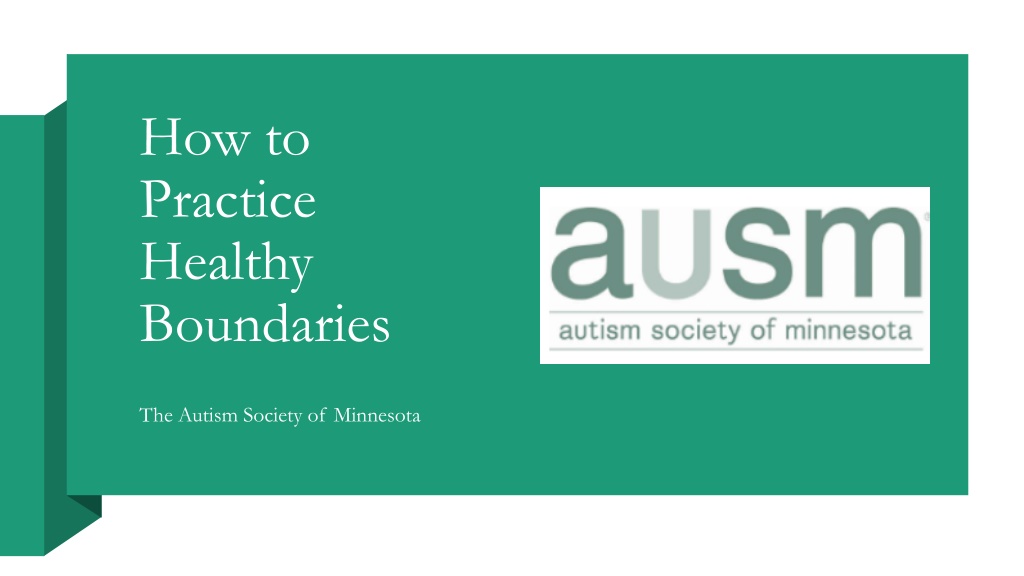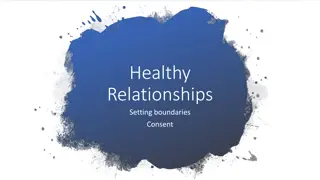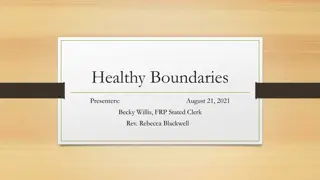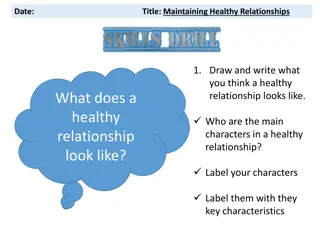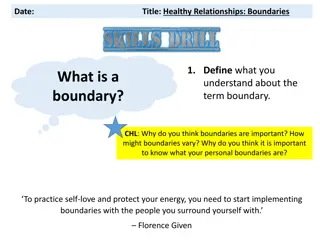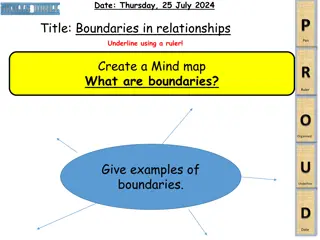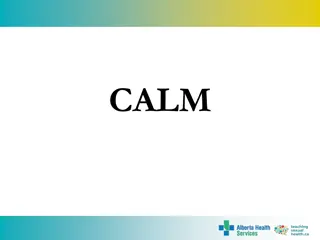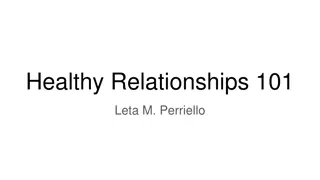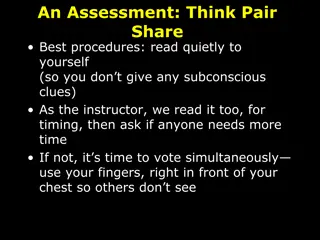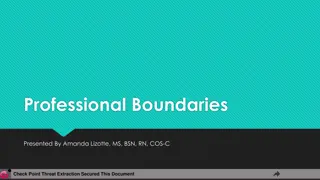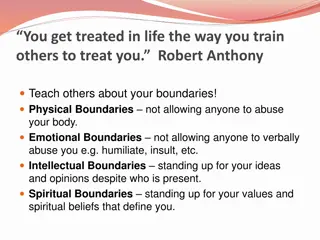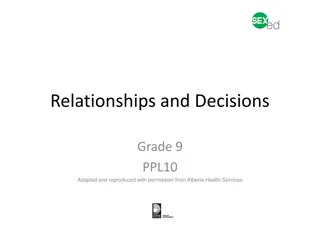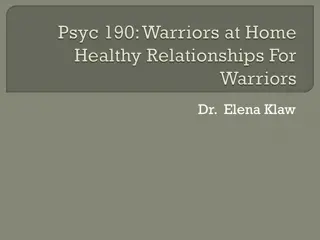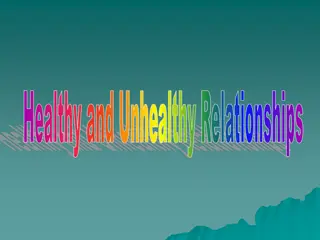Practicing Healthy Boundaries: A Guide for Better Relationships
Discover the importance of setting healthy boundaries to enhance self-care, respect, and positive interactions in various relationships. Learn how to define, communicate, and uphold boundaries effectively to foster trust and equality while avoiding unhealthy boundaries that can lead to fear and inability to say no.
Download Presentation

Please find below an Image/Link to download the presentation.
The content on the website is provided AS IS for your information and personal use only. It may not be sold, licensed, or shared on other websites without obtaining consent from the author. Download presentation by click this link. If you encounter any issues during the download, it is possible that the publisher has removed the file from their server.
E N D
Presentation Transcript
How to Practice Healthy Boundaries The Autism Society of Minnesota
What are Boundaries? Boundaries are lines, physical and/or emotional, that others cannot cross without my permission. Boundaries are expectations that I can set that people can and cannot do based on what I m comfortable with. It s important for people to respect my boundaries. It is important for me to respect and follow another person s boundaries. Boundaries help me stay healthy and safe.
Why is it Important to Set Boundaries? Boundaries help keep me safe. Boundaries help me practice self-care and self-respect. Boundaries help me have positive interactions with others. Boundaries help me decrease my stress levels and burn out. Boundaries help me communicate my needs in a relationship. Boundaries help me set limits in relationships that are healthy. Boundaries help me understand clear expectations of myself and others.
Boundaries in Relationships Boundaries help me improve relationships with people in my life. There are many different types of relationships that I may have. A relationship is any connection between two or more people. These can include romantic relationships, friendships, familial relationships, colleagues, co- workers, teachers, PCAs, classmates, etc. Healthy relationships respect boundaries from both parties. I can respect someone s boundaries by listening to what they say and following their rules. I can set boundaries with myself to help hold me accountable.
How Can I Set Boundaries? Define the Boundaries I can identify my desired boundary. Communicate the Boundaries I can say what I need from that person(s)/relationship(s). Simplify the Boundaries I don t have to overexplain my boundary. I can be clear and concise. Set Consequences for Violating the Boundary I can say why this boundary is important. I can state what will happen if it is not respected.
Healthy Boundaries I can set a boundary with someone at any time within my relationship with them. My boundaries may be different than someone else s boundaries. Boundaries can help me have trusting and equal relationships with others. I shouldn t feel guilty about establishing healthy boundaries. I can be assertive and say yes or no to others confidently. I can take responsibility for setting and respecting other people s boundaries. I can create boundaries that make me feel safe and comfortable.
Unhealthy Boundaries Unhealthy boundaries can look very different. If I feel scared or that I cannot say no to a person (or group of people) I am with, it may be because they exhibit unhealthy boundaries. I should not feel guilty for setting boundaries. Sharing too much personal and/or private information too soon may be a sign that someone has unhealthy boundaries. If someone is using a boundary for control or to disempower me, then this is an unhealthy boundary.
Unspoken Boundaries I can think about what boundaries I can have with others that are not outrightly stated. How would I greet a romantic partner? A friend? A family member? A colleague/peer? Who would it be OK to kiss? Who would it be ok to hug? Who would be ok to hold my hand? Who would I feel comfortable inviting to my house for dinner? Who can I talk to if I m worried or concerned about something?
Types of Boundaries Boundaries can look like: Physical Boundaries : I need to eat. I am going to take a five-minute break. Emotional Boundaries : Talking about true crime bothers me. Can we talk about something else? Time Boundaries : I can only stay for an hour. Sexual Boundaries: Do you consent to _? Intellectual Boundaries: I can respect that we have different opinions on this topic Material Boundaries: I m happy to share my board games with you.
Respecting Your Boundaries When people respect my boundary(s) I feel good and confident. I feel safe and like I can tell people no and the truth about how I am feeling. I can make sure that I respect my own boundaries. There are going to be people who might not understand or respect my boundaries. It is important to think about how I feel when someone crosses my boundaries. Feeling anxious around that person Feeling like I am not able to ask for help Feeling bad, sick or embarrassed after I spend time with that person I can talk to someone who has healthy boundaries and feels safe to me, like a therapist, friend or family member, about a person who does not respect my boundaries. I can think of a plan about how to interact with people who do not respect my boundaries. I can decide whether or not I want a romantic or platonic relationship with someone. If I don t want a relationship with someone, I can tell them that I don t want to have a continuing relationship with them. I am not responsible for someone s feelings or reactions to my boundaries. I can set this boundary in a respectful way that honors both my feelings and theirs.
Respecting Others Boundaries I can respect other s boundaries that they set. When I respect people s boundaries, that person feels safe and can trust me. If I m confused about someone s boundaries, I can ask clarifying questions to make sure I don t cross their boundaries. I can ask someone if they are on the same page with me. I can respect someone s decision if they do not want a romantic or platonic relationship with me. I can recognize that rejection can hurt, but it does not mean that I am a bad person. I don t have to like or love someone, but I should try and respect them and their boundaries.
Resources https://www.mindbodygreen.com/articles/six-types-of-boundaries-and-what-healthy- boundaries-look-like-for-each https://www.ualberta.ca/anesthesiology-pain-medicine/media- library/documents/workbookbuilding-better-boundariesfeb2011.pdf https://positive.b-cdn.net/wp-content/uploads/2022/03/Setting-Internal-Boundaries.pdf https://www.uky.edu/hr/sites/www.uky.edu.hr/files/wellness/images/Conf14_Boundaries.pd f https://www.therapistaid.com/worksheets/boundaries-psychoeducation-printout
